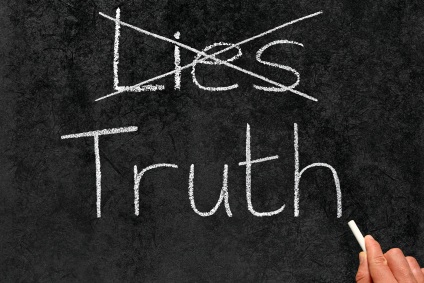What Lie Will You Tell Today?
“I’m not upset that you lied to me, I’m upset that from now on I can’t believe you.”
― Friedrich Nietzsche
There something about telling the truth! It can disarm, humble, or even impress a buyer. The truth builds relationship, even contentious ones. There is also something else about telling the truth that is even more important: Its easy to remember!
_________________
You have seen in previous posts my comments about telling the truth in the sales process. It is without fail that when a sales professional gets immersed in small lies, they graduate to being able to tell the larger ones with aplomb, and without much hesitation.
I will clarify what I mean, and I am almost certain you will know someone who engages in the practices that we are talking about. The truth has a strange way getting in the way for some sales professionals. Being honest about the fit of your product and the customer’s needs is an essential part of the process. If you are caught in a lie in the sales process, your chances of a good relationship are diminished.
What Kind of Lie?
There are several different types of lies that are common in the sales process. I would suppose that it would be simple to say this a prohibition against lies should apply only to the “big ones.” To be truthful, that is not correct. Sprinkling your encounters with customers with lies cannot result in any great advantage worth losing your credibility over.
We spoke in Black Sales Journal 3/31 Credibility – The Goal of the Black Sales Professional,regarding this issue, which is so important. It cannot be denied that credibility is the “pot of gold at the end of the rainbow” for the Black sales professional. You cannot manufacture it, you must earn it, and it can be fleeting if you are not careful.
Lies of Convenience
I am sure that we all believe that there are small imperceptible lies to customers that don’t matter. They are small, and meant to be “convenient” type lies. This is convenient for whom? I think you get it. The small lie, which is told to the customer, is for the convenience of someone else. It may be that you cannot get delivery until next month, even though the product is needed next week. Missing this sale would be better than losing the confidence of customer.
If you are lying for convenience, rethink it. That small lie for convenience can break any confidence and trust you have if you get exposed. Think of your relationship with the customer based on the “life value” of the customer. The total amount of business that you can get from this particular buyer, whether he/she stays at this current organization or not, is what should be considered, this year, the following year, and the years after. The total of this is the life value. To guess at it, multiply the value of the average sale (in dollars) times the average amount of transaction or sales that will occur in the life of that relationship. Sometimes, you might find yourself surprised by the size of that number.
The confidence that you maintain with the buyer will go well past the fact that you don’t deliver in a particular instance. Tell the truth and you will be recognized for delivering “when you say you will.”
Lies in the Middle
Obviously, these are not necessarily big, but they do happen. Yes, there are sales professionals who would tell something other than the truth about their product or service to get the commission or bonus. The problem comes when the performance is not there, and someone loses confidence in you and your product or service. Knowing the features and benefits of your product or service, is what you do. You can easily substitute, or contrast a different feature when you know your product/service is not the leader in particular area. When you say things about your product/service, or your organization that are misrepresentations, it may be sales talk, but it is still a lie in the eyes of a customer.
Lies to avoid embarrassment or cover for mistakes are lies told which could be avoided.
Lies for Profit – The Big Ones
If you know someone who is telling lies to consummate the sale, and thus pocket commissions or bonuses, then they are involved in the “big one.” I only say this because if they can twist the truth for the self of self-aggrandizement, I suppose that they have decided that this is a job, and not a career. It will catch up with them at some point. Obviously, no suggestion in a journal like this will change their mind.
I will say a couple of things about the process of lying in sales. In a profession where relationships change everything, a lie can change the landscape.
A Case for the Truth
The energy expended on the lie, and the “maintenance of the lie” is consuming. Additionally, the truth is easy to remember. No need to expound on this issue. So it is noble to tell the truth, and may expose you to some chagrin, yet we all make mistakes, forget, and have errors in judgment.
Resort to the truth and you will find that the best customer is the one that appreciates you because you are an honest professional. Sales professionals who tell the truth don’t always get the business, yet they secure and grow relationships.
Some sales roles are transactional, but for some of the best compensated it is a relationship game. Don’t forget it!
We welcome your comments.
 August 14, 2014
|
Posted by Admin9!
August 14, 2014
|
Posted by Admin9!

 Categories:
Categories:  Tags:
Tags: 

Your Comments